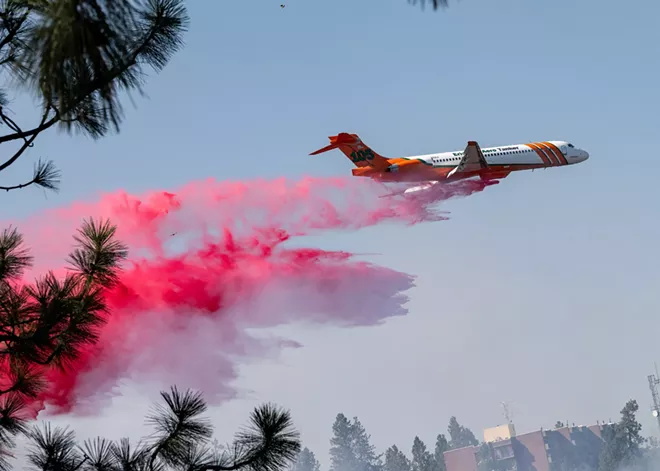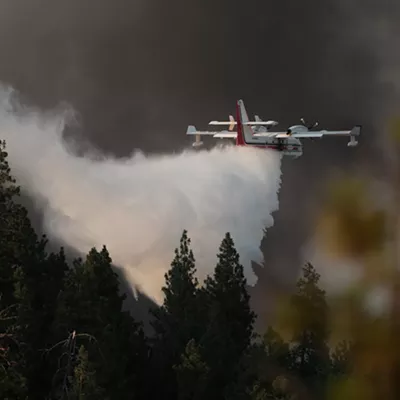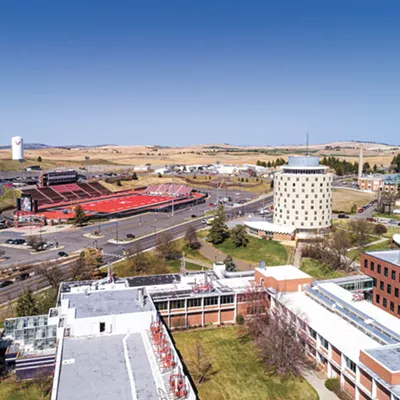It's been almost half a year since devastating wildfires swept through the Medical Lake area and Elk on the same day, destroying more than 360 structures and killing two people in Spokane County.
While about half of the people who lost their homes have already filed plans to rebuild, the other half are still working through the process.
State and federal resources are available, but recovery has been stalled somewhat as emergency managers wait to learn whether President Joe Biden will declare the fires a disaster and allow Federal Emergency Management Agency assistance to move forward.
Until it's clear whether that federal relief is coming, it's hard to move forward with other potential relief such as low-interest home loans from the Small Business Administration, says Medical Lake Mayor Terri Cooper.
Because there wasn't enough damage to public infrastructure to automatically qualify the area for public assistance from FEMA (the threshold is about $37 million), Cooper says that both public and individual relief requested by Gov. Jay Inslee is waiting on a presidential declaration.
"Because we didn't meet those automatic thresholds, it has to go in as a special request," Cooper says. "Our losses were all homes. ... Usually the public assistance then triggers the individual assistance. We haven't received either of those."
Individuals have already had to shell out money to test for asbestos and get certified contractors to clear debris. Cooper says Medical Lake also rallied volunteers to clear tens of thousands of damaged trees that could have cost each homeowner thousands of dollars to remove. Everything down to the foundation and the soil underneath burned homes needs to be replaced, she says.
While Spokane County will reimburse homeowners for the asbestos tests with some money provided by the state, it's unclear how much federal money might be able to reimburse the extensive cleanup that's already been done.
The long wait to learn whether federal relief is coming has frustrated those leading the recovery process, and it's a familiar situation.
U.S. Sens. Maria Cantwell, D-Wash., and Jim Risch, R-Idaho, introduced the MALDEN (Making Aid for Local Disasters Equal Now) Act last week to address those wait times. Named for the Palouse town of Malden that was almost totally destroyed by the Babb Road Fire in 2020, the act is companion legislation to a House bill by the same name introduced late last year by U.S. Rep. Cathy McMorris Rodgers, R-Wash. The legislation intends to speed up decision making at the federal level and would require FEMA to provide caseworkers for rural individuals impacted by a disaster even if individual assistance is denied.
McMorris Rodgers met with Spokane County commissioners and state and local emergency managers to discuss the federal holdup on Jan. 24 during a wildfire roundtable.
"This becomes an issue. It became an issue following Malden and again, it's becoming an issue here where we're in this waiting period," McMorris Rodgers told the roundtable. "The MALDEN Act would provide, even before all of these assessments and emergency declarations, that FEMA would bring in the caseworker to help from the very beginning. ... They would be able to help a local community and the state work through the processes."
Mayor Cooper says she'd also like to see Washington put long-term recovery groups in place so that communities can better respond in the immediate aftermath of an emergency and make dollars go further. State Rep. Mike Volz, R-Spokane, has introduced a bill to do just that (House Bill 1952).
"Washington has a well-coordinated emergency response system. As the decisions come down and money flows, it's very coordinated, it's practiced," Cooper says. "When we get to this recovery work, we don't have that model. We need a streamlined chain of command and efficient way to get resources."
She'd like to see the state prefund that recovery, so teams could go to communities affected by disasters and immediately help them set up their own nonprofit long-term recovery groups.
"Right now, trying to navigate that [system], it's clunky and disconnected, and it causes frustration," Cooper says. "We need public dollars to clean up the mess. That should happen in the first three to four weeks, not five months later like we're seeing. There are properties that haven't even been touched yet because they didn't have the money, weren't insured, or with insurance, by the time they paid out, there was nothing left."
Many homeowners still have to make mortgage payments on homes that no longer exist, in addition to figuring out how to build again. With the cost of homes increasing so much in the last five or six years, most who had insurance were underinsured, Cooper says.
"It's important to understand that this was the highest number of primary residence losses in a single fire in the state of Washington history," Cooper says. "We really need a 'Yes.'" ♦


























